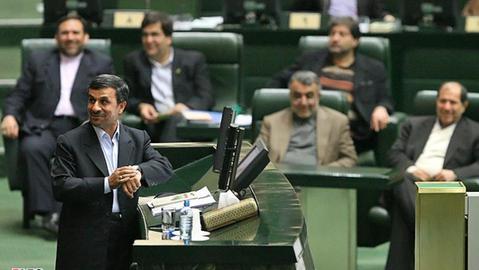A ruling by the high court in London has just made relations between Britain and the Islamic Republic of Iran more complicated, increasing friction at an already tense time.
The court ruled this week that the International Military Services (IMS) does not have to pay Iran interest on the prepayment for the purchase of hundreds of Chieftain tanks that were ordered by the Shah’s government but were not delivered as a result of the 1979 Islamic Revolution. The Shah had ordered 1,750 tanks and support vehicles for £650m from the IMS, but only 185 were delivered. Ever since, the Islamic Republic has demanded the money back.
The International Chamber of Commerce sided with Tehran in an arbitration that concluded in 2009. The dispute was thought to have been settled in 2010 and it was expected that the IMS would transfer more than £390 million plus interest to an account holding Iranian assets, which Tehran could not touch because of EU sanctions.
More than 18 years have passed since the initial case opened, and more interest has been accrued, but the International Military Services has argued that the debt to Iran was not paid as a result of EU sanctions and the British government’s obligations under EU rules. Therefore, it argued, IMS had no role in the financial dispute and must not be forced to pay for it. The London high court recently agreed with this argument, heightening tensions between Tehran and London.
The ruling by the high court said that the UK did not owe interest accumulated over 10 years on the sum it acknowledges it owes Iran. The issue of whether there is an Iranian body to which the UK can lawfully pay the £387 million remains to be determined.
Earlier, when asked in the House of Commons about the financial dispute between the two countries, the then-minister of defense had said that the sum in dispute was somewhere between £32m and £41m.
As the case was winding its way through the high court, British media reported that money has not been paid to Iran because the UK Ministry of Defense has opposed it, reporting that the ministry believes that the Islamic Republic would spend the money for “destructive” military purposes in the region, including in Lebanon, Syria and Yemen.
A Hostage for the Money
The financial dispute between the two countries is closely tied to the case of Nazanin Zaghari-Ratcliffe, the Iranian-British charity worker jailed in Iran since 2016. Boris Johnson, the new British Prime Minister, was informed about the financial dispute when he visited Iran in 2017, when he was the UK’s foreign secretary. Both Zaghari-Ratcliffe and the sum demanded by Iran were the subjects of talks between Johnson and Iranian officials and it was reported that Britain might pay the sum in cash to bypass banking restrictions due to US sanctions. However, this did not happen.
In recent months British officials have been more forthcoming about the connection between the imprisonment of Nazanin Zaghari-Ratcliffe and the financial dispute. During a visit to Tehran in November 2018, Jeremy Hunt, the British Foreign Secretary at the time, asked Iranian officials to separate the fate of Zaghari-Ratcliffe from the financial dispute. He was unsuccessful and later said: “The problem is if you pay ransom money for someone who is a hostage then all that happens is you might get that hostage out, but the next time they want something they’ll just take someone else hostage.”
The UK has kept the money the Shah paid for the Chieftain tanks for more than 40 years, and it has refused to pay back this money for 18 years, despite the ruling by the International Chamber of Commerce. In the 1980s, the UK even sold some of the tanks ordered by the Shah to Saddam Hussein’s Iraq, at a time when the country was in a protracted war with Iran. The irony is that the Shah had ordered tanks that would match Iran’s climate so that it would have more robust defense capabilities vis-à-vis Iraq.
With the situation as it stands now, it would be extremely difficult for the Islamic Republic to get back the prepayment for the tanks. The International Military Services has deposited the money in an escrow account in the name of London’s high court, pending a court ruling.
In his ruling, Justice Phillips of the high court said that the IMS did not have to pay any interest for the last 10 years — meaning since Iran was hit with international sanctions over its nuclear program and has been unable to conduct transactions with the international banking system.
If Iran now insists that it must be paid the full amount, the issue must be settled outside the court, and it will be the British government that will have to pay the difference, an amount that, according to the British defense ministry, is around £41m. Otherwise, Iran must appeal the ruling to the High Court of Justice and, considering the speed with which this court handles cases, the process might add a few more years to the longest-running dispute between the United Kingdom and the Islamic Republic of Iran.
Related Coverage:
Revolutionary Guards’ Seizure of British Tanker Violated International Laws, July 23, 2019
Was Iran’s Seizure of a British Ship Legal?, July 20, 2019
UK Grants Diplomatic Protection To Free Nazanin, March 8, 2019
Britain to Hit Iran with Sanctions After Brexit, February 10, 2019
No Release for Nazanin Until UK Pays Debt, July 23, 2018
Iran-UK Debt Dispute Keeps Nazanin in Jail, February 23, 2018
visit the accountability section
In this section of Iran Wire, you can contact the officials and launch your campaign for various problems


























comments